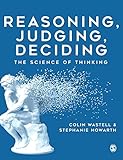Reasoning Judging Deciding The Science of Thinking
Publication details: London Sage Publishing 2022 Description: xi, 415p. 23 cmISBN: 9781526491077Subject(s): Cognitive Revolution, Ecological Rationality, Artificial Intelligence, Sceptical ThinkingDDC classification: 153.4 Online resources: Click here to access online| Item type | Home library | Call number | Materials specified | Status | Date due | Barcode |
|---|---|---|---|---|---|---|
 Books
Books
|
V.M. Salgaocar College of Law, Miramar - Panaji Law | 153.4 WAS/HOW (Browse shelf(Opens below)) | Available | VMS-022845 |
Chapter 1. Inheritors of the Enlightenment Chapter 2. A Cognitive Revolution? When the mind began to matter! Chapter 3. Thinking Under Uncertainty: Expected Utility Theory Chapter 4. Prospect Theory: Heuristics and some biases Chapter 5. Ecological Rationality: Are humans effective thinkers? Chapter 6. Dual Process Models: Is the mind made up of two components? Chapter 7. Mind: Modular and Extended: Is the mind made up of many components, internal and external? Chapter 8. Deduction, Induction, Abduction: Reasoning formal and speculative Chapter 9. Problem Solving Including Analogical Reasoning: Learning to answer the question that is asked! Chapter 10. Imagination: The play space of the mind Chapter 11. Nudge: Making good outcomes more common Chapter 12. Expertise: How do experts think? Chapter 13. Moral Reasoning: How do people decide on what is right? Chapter 14. Cognitive Science of Religion: What can models of the mind tell us about belief in the supernatural? Chapter 15. Artificial Intelligence: Computer thinking: What kind of thinking can computers really do? Chapter 16. Argumentative Theory: Is the construction of arguments central to human thinking? Chapter 17. Three Thinking Illusions: How much of our thinking is done alone? Chapter 18. Thinking and Uncertainty: What effect does not knowing for certain have on our thinking? Chapter 19. Thinking Scientifically: Easy or hard? Chapter 20. Conspiratorial Thinking: Why are people so suspicious of governments and big business? Chapter 21. Sceptical Thinking: How to avoid being duped by fake news!
Are humans effective thinkers? How do we decide what is right? Can we avoid being duped by fake news?
Thinking and Reasoning is the study of how humans think; exploring rationality, decision making and judgment within all contexts of life. With contemporary case studies and reflective questions to develop your understanding of key dilemmas, this book covers the fundamentals of the science behind thinking, reasoning, and decision-making, making it essential reading for any student of Thinking and Reasoning.
From heuristic biases to the cognitive science of religion, and from artificial intelligence to conspiracy theories, Wastell & Howarth’s text clearly and comprehensibly introduces you to the core theories of thinking, leaving no stone unturned, before showing you how to apply theory to practice.
‘The unique selling point of the book is the inclusion of current topics and recent developments, a very good structure and it approaches the field from a very wide angle.

There are no comments on this title.